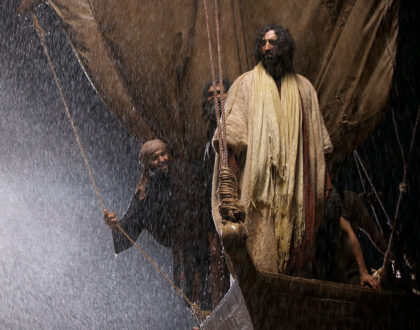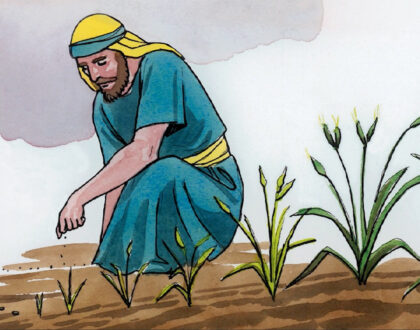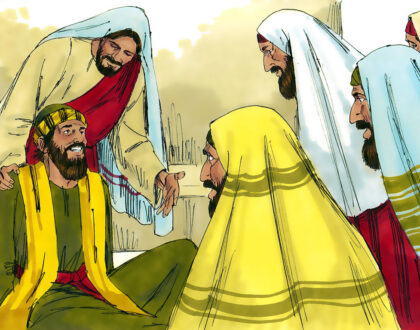Recognizing Our Need of God
“Recognizing Our Need of God”
Archbishop Loren Thomas Hines
First Sunday of Lent
February 14, 2016
Readings: Deuteronomy 26:1-11, Psalm 91:9-15
Romans 10:8b-13
Luke 4:1-13
We begin with the Great Litany – a recognition of our dependence on God. We cry out to Him, of our need for Him. Lent helps us understand our humanity and our weaknesses. It encourages us to rise above our humanity when temptations come our way.
Psalm 91 sets the course for our daily lives. “For you have made the Lord my refuge; even the Most High your dwelling place. No evil will befall you, nor will any plague come near your tent” (verses 9-10). We forget this truth when faced with dire circumstances, but our outlook will change when we recognize the might of the God we serve and how much He loves us.
In Deuteronomy in the Old Testament, we read of how we should rejoice in all the good that God has given us by honoring Him with the fruits of our labor. This was the instruction given to Israel as they entered the Promised Land – to offer up to the Lord the first of the produce of the ground which the Lord gave them. This principle was fulfilled by Christ. In the New Testament, God established His righteousness in us through Christ. “For by these He has granted to us His precious and magnificent promises, so that by them you may become partakers of the divine nature, having escaped the corruption that is in the world by lust” (2 Peter 1:4). Because of this great gift from God, we are to “put on the new self, which in the likeness of God has been created in righteousness and holiness of the truth” (Ephesians 4:24). God did this for us. We don’t have to do it for ourselves because we can’t. Christ gave us His righteousness.
I want to take time to talk about the Gospel. Up until His baptism, we have no record of miracles taking place in the life of Christ. But during His baptism, God declared, “You are My beloved Son, in You I am well-pleased’. This declaration was also done that the devil may know God’s Son.
When God created man, He gave him the responsibility to rule over the earth. In Genesis 1, God gave man the mission to “be fruitful and multiply, and fill the earth, and subdue it and rule”. God created the world for man and gave it to him to take care of it. He put Adam in the Garden of Eden to “cultivate and keep it” (Genesis 2:15). However, when temptation came, man did not stand in his authority. He gave in to the deceitfulness of the devil who fooled him into believing that he can be greater, like God Himself. Man did not realize that he was already great, having been given charge of all creation. He wasn’t satisfied with what was given him, so he yielded to Satan and in the process, gave him the earth. We read this in the Gospel, Satan claiming the world as his when he tempted the Lord a second time: “I will give You all this domain and its glory; for it has been handed over to me, and I can give it to whomever I wish” (Luke 4:6).
The second Adam, Christ, came directly from God. If He was to set the world free and get the earth back from Satan, He had to be tempted, the same way the first Adam was. This is why the Holy Spirit led Him away to the wilderness after His baptism. Christ had to prove who He was. Satan knew that the day would come when God would send a Messiah to save His children, but he didn’t know who this man would be. He knew of the prophesies that a Messiah would come to save the world, and he had been watching Christ, but Christ by then had done nothing to prove that He was the One. This is why at the Lord’s baptism, God wanted the world and Satan to know that Christ is His Son, the One who will take back the world from him. At His baptism, Christ was filled with the Holy Spirit. (In our own baptism, we are also filled with the Holy Spirit who gives us the strength and authority to overcome temptations and tests.)
After the Lord’s baptism, He was led around by the Holy Spirit in the wilderness for forty days, being tempted by the devil. In all this forty days, the Lord ate nothing. The wilderness is the symbol of the fallen world. Israel was in the wilderness for forty years where they were repeatedly tested if they would put their trust in God. But even when they rebelled, God continued to feed them and take care of them. He took them out of the wilderness into the Promised Land.
Adam was already in Paradise but was led by Satan into the wilderness. Jesus was in the wilderness, but He was taken into Paradise by the angels sent by God to minister to Him after He thwarted all attempts by Satan to yield to him. When He went to Paradise after His resurrection, He also took all of us with Him.
Adam was given life but he died because of his disobedience. Christ died but came back to life, conquering death and the grave. He gave life to the world. The forbidden tree brought death to Adam. He yielded to the temptation to eat of the fruit of the forbidden tree and this brought him death. Christ was tempted with bread after being without food for forty days but He refused. The enemy knew that Christ wouldn’t take bread from him so tempted Christ to prove that He is the Son of God by turning stone to bread. Christ did not succumb to the temptation. He didn’t deny His hunger, but simply quoted Scripture: “Man shall not live on bread alone”. The second Adam (Christ) took the place of the first Adam by taking the tree/the cross to save us.
Satan showed Christ all the kingdoms of the world in a moment in time and tempted the Lord with them, claiming that the world is his; had been handed over to him. Imagine what the Lord must have felt when Satan said all this knowing that it was He Himself, the Lord who created the world and all creation. But instead of arguing with Satan, the Lord said, “It is written, you shall love the Lord your God and serve Him only”. He didn’t try to prove Himself but simply obeyed His Father. Israel stayed forty years in the wilderness and failed in all its testings. Christ stayed forty days in the wilderness and overcame all temptation, doing this for man. He overcame the failure of man and put an end to the rule of Satan.
The account of how Christ overcame the temptations of the enemy is very powerful. In our lives, whenever we are faced with temptation, we must not yield to it but instead put our faith in God. In Romans 8, we learn that God gave us His holiness and righteousness through Christ. He did it for us; we don’t have to do it ourselves. “Self-made righteousness” won’t stand. It isn’t a matter of obeying a list of do’s and don’ts but using the faith that has been given to us.
Moses was with God on the mountain for forty days but he failed in making Israel obey God and put their faith in Him. Israel was in the wilderness for forty years but also failed. Jesus was in the wilderness for forty days and He conquered. For this purpose Christ was manifested – to destroy the works of the enemy.
Notice how just God is, even to His enemies. Christ could have just told Satan to “be gone!” but he didn’t. He had to take back the earth from Satan. It had to be man, flesh that would destroy the enemy. We are flesh. We don’t have to yield to the enemy.
Satan left. The angels came to minister to Christ. Satan gave up, but not totally. He would wait for another opportune time to come against the Lord.
This Lenten season, we must understand what Christ went through to give us back our freedom. Let us recognize our need of God and walk with Him, confident that He is always with us. There’s no reason for us to fail and succumb to temptation. Let us recognize or need of God and our dependence on Him. He is our confidence and strength. Let us learn from Christ’s victory over temptation in the wilderness.
Recent Sermons

Jesus, Calmer Of Storms
June 23, 2024

Harvest Time Stemming From The Smallest Seed
June 17, 2024

Not Bound By Limitations To Minister
June 10, 2024

